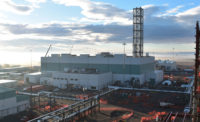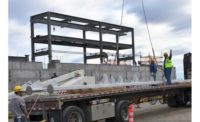 |
| Going Up. Seismic rules and industry conditions may propel cost hikes. (Photo courtesy of Dept. of Energy) |
New regional seismic standards and changing conditions in nuclear construction prompted Bechtel Group to revise project cost estimates, say company officials. The complex includes a waste pretreatment plant and high-level and low-level vitrification facilities.
Bechtel submitted a new cost proposal to DOE last month. The Army Corps of Engineers reviewed Bechtels revised estimate and submitted its findings to DOE officials, a department spokesman says. Neither the Bechtel estimate nor the Corps review has been made public. But Bechtel officials say the changes reflect a "significant impact" on the cost.
The biggest added cost stems from revised seismic criteria submitted to Bechtel in February. The complexs design so far was based on 1996 criteria, which now must be upgraded by 38%. The change was based on a seismic study that included 500-ft-deep boreholes beneath the construction site. "About every 500 years, we could be subject to a 9.5 magnitude earthquake," says a Bechtel official.
The design, now 70% complete, must be recalculated. "Hundreds of thousands of engineering calculations must be reviewed," says John Britton, Bechtel Hanford spokesman. Construction, about 35% complete, will be slowed until recalculations are complete.
The pretreatment and vitrification complex will treat 53 million gallons of high-level waste now in underground storage tanks at the site. Much of the volume will be reduced to low-level waste after pretreatment. The plant is the largest construction site in the U.S., equal in size to building up to three commercial nuclear powerplants. Price hikes on the large quantities of steel and other materials, are also a key factor, says Bechtel officials. Other technical issues boosting the price include design of air pumps needed to keep waste in a liquid state. "It was a conceptual design for the first nuclear use," Britton says.
The last time a company revised its estimates on the complex, DOE forced it off the project. BNFL, which had a contract to build and finance the plants and recoup its costs as waste was treated, raised its cost estimate from $6.9 billion to $15.2 billion. The contract was cancelled in 2000 and rebid as cost plus.
fficials of the U.S. Dept. of Energy hope to know by mid-June exactly how much more than $5.8 billion it will cost to build the huge radioactive waste treatment complex at the Hanford, Wash., site.

